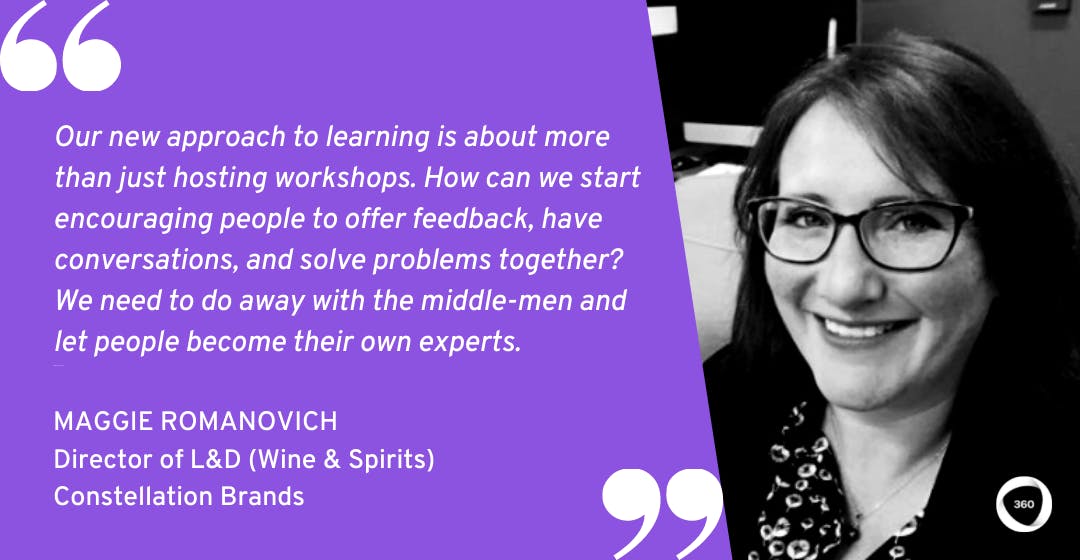
How Constellation Brands Flipped Classroom Training and Freed Their Subject-Matter Experts
As L&D leaders, we want learners to engage with internal subject-matter experts to develop new skills, grow their capabilities, and help our organizations succeed. But sometimes, you can have too much of a good thing.
What if all that sharing becomes too much for your experts? What if your specialists are too busy helping others to focus on their own day-to-day projects? It’s a tricky problem, and one a lot of well-meaning L&D teams need to solve.
Recently, I had the pleasure of chatting to Maggie Romanovich, Director of Learning and Development (Wine & Spirits) at Constellation Brands, about how she freed up her subject-matter experts by empowering learners with self-paced learning and communities of practice.
The result? More flexibility for learners and more bandwidth for subject-matter experts to focus on their core responsibilities. Read on to find out how they achieved this win-win situation.
The L&D challenge of being a growing global company
Constellation Brands is the company behind many of North America’s favorite names in beer, wine, and spirits. As a growing company, Constellation’s global presence gives rise to some big challenges for L&D.
“As Director of Learning & Development for Wines and Spirits, I’m focused on supporting our retail-focused sales teams, as well as our category leaders,” says Maggie. “Our organization is large, and one of my key roles in L&D is to help people navigate internal relationships.”
“We’re a global company, and this leads to some unique challenges in our L&D. I focus on the United States, but we’re geographically diverse. We have all these different national account teams, and they’re positioned all over the country.”
As Maggie explains, the COVID-19 pandemic created some new complications for L&D. “Our geographic diversity was a challenge before, but the pandemic really put this into focus. Everybody was home, and nobody was travelling. We couldn’t sneak learning into a sales training, or have a two-day workshop in some fun location that also included team-building.”
So, how did Maggie and Constellation Brands meet this challenge?
Our geographic diversity was a challenge before, but the pandemic really put this into focus. Everybody was home, and nobody was travelling. We couldn’t have a two-day workshop in some fun location that also included team-building.
Need a few more CLO Connect expert insights? Find out How L&D Can Help Your Company Scale
How Constellation Brands ‘flipped’ traditional classroom training
According to Maggie, meeting the L&D challenges of COVID-19 required some radical new approaches.
“Our first response was to flip the traditional approach to classroom training,” she says. “Previously, we’d sign up for some standardized in-person software training from an online provider and practice everything individually later.”
“Now, we’ve flipped it. Rather than learning the concepts together and practicing on our own, we’re learning the concepts on our own, in our own time, and in a safe place. Then we come together in the workshop to create the work together. This means if people are having trouble with particular concepts, they can go back and revisit the learning material at their own pace.”
This new approach is already starting to pay dividends. “We started doing this with Power BI, the Microsoft data and analytics tool. It’s a really difficult concept, and we found that with our old approach to training, it wasn’t as effective after people stepped away from the business for five days. As a result, people weren’t using the training. It also costs a lot of money.”
“Now, we’re able to take a whole month to go through a seven-hour e-learning at our own pace, then come together with an expert to test our knowledge with a shared exercise. It means that people are using the training a lot more.”
One other benefit to Constellation Brands’ new training approach? Freeing up subject-matter experts.
Related: Pivoting to Agile Learning Could Revolutionize Your Learning Culture
Now, we’ve flipped it. Rather than learning the concepts together and practicing on our own, we’re learning the concepts on our own, in our own time, and in a safe place. Then we come together in the workshop to create the work together.
Freeing up subject-matter experts with communities of practice
“One other challenge with being a geographically diverse company is that you might only know the people you’re exposed to everyday,” says Maggie. “You have team meetings, but you don’t have casual conversations to figure out who the experts are. This means the subject-matter experts who are already visible remain visible. They’re the people you keep calling for help.”
As Maggie explains, relying on the same pool of subject-matter experts can result in some people feeling burned out and overwhelmed. “From my position as L&D Director, I can see what different teams are doing. For example, one person approached me because they’d been getting a ton of calls to help with learning, and they didn’t have time to do their job.”
So, how did Maggie respond to this? “We pulled together a starter group of other experts who were having the same issue, and we developed a top-ten list of the questions they were getting most often. We ended up creating an FAQ to address these questions, including creating videos for people to learn more.”
“We used these resources to create communities of practice. Now, once each month, we host our category knowledge circles on different topics. We post these to everyone, and we encourage anyone who is interested to come along. We might talk about predictive analytics, or how to value expanded shelf space.”
Creating these communities of practice is a key part of Collaborative Learning. By connecting teams together, L&D teams can help people declare their learning needs and achieve their goals without having to ask subject-matter experts for help on an individual basis.
Related: Experts Engagement Tool: Leverage Subject-Matter Expertise With Collaborative Learning
Now, once each month, we host our category knowledge circles on different topics. We post these to everyone, and we encourage anyone who is interested to come along. We might talk about predictive analytics, or how to value expanded shelf space.
Encouraging people to ‘become their own experts’
In addition to creating communities of practice, Constellation Brands is also encouraging people to ‘become their own experts’. As Maggie explains, this starts with emphasizing the social component of learning.
“We have casual conversations on a range of specialist topics,” she says. “This gives us an opportunity to identify more experts, because people reveal that they know about these topics, too. It all started by having video call meetings where our subject-matter experts would have a problem to solve, and we’d present different solutions to that problem together.”
“There’s a social component to this learning too, because we’re collaborating through an online platform. This means people can follow-up on the training with new questions, and they can communicate through our forums and channels.”
This new approach has already started to give subject-matter experts a little more room to breathe. “We’ve created a new network of people who can call each other, rather than relying on the same five people to repeatedly share their expertise. It loosens the reins on our experts and lets them do their day jobs while still contributing to our shared learning.”
“Thinking about the 70-20-10 rule, only 10% of our learning is formal. The rest of it comes down to experience and learning from each other. As L&D professionals, the question for us is how we facilitate that, especially when we’re not all able to come together due to a pandemic.”
For Maggie, this new approach isn’t just about making minor changes. “Our new approach to learning is about more than just hosting workshops for people once a week. How can we start encouraging people to offer feedback, have conversations, and solve problems together? We need to do away with the middle-men and let people become their own experts.”

So, how has this new approach to learning impacted Constellation Brands so far?
The impact of Constellation Brands’ new approach to learning
For Maggie and Constellation Brands, there’s one key way to measure the impact of their new approach to learning: are people excited?
“People are talking about our new community of practice sessions, and they’re wondering when the next one is,” says Maggie. “The attendance has increased a lot. At first we had just a handful of people, but now I’m seeing people forward it on to their colleagues. There’s a much greater level of interaction, and more views for our videos.”
“Based on our conversations with the communities of practice, we’ve also created some new videos that address some major questions. This frees up more time for our experts. I’ve actually had calls from our subject-matter experts to let me know they’ve had time to finish up other projects because we’ve created these new resources for people to use.”
This new approach is doing great things for Constellation’s learning attendance, too. “Beyond this anecdotal evidence, we know there are a greater number of participants, and these participants are engaging with the material to a greater degree. People are coming to me with ideas for new training, which is really encouraging.”
“This gives me the ability to test things out, because if certain content works in our communities of practice, chances are it’ll work in our formal training, too. It’s a lot more collaborative for everybody.”
Related: 3 Data-Based Ways to Prove Training ROI (+ Free Training ROI Calculator)
I’ve actually had calls from our subject-matter experts to let me know they’ve had time to finish up other projects because we’ve created these new resources for people to use.
Thanks again to Maggie for being so generous with her time!
While you’re here, check out my expert interviews with Joshua Clark of Cisco about how he empowers employees to navigate career opportunities, and with Jeff Lowndes of Snap about his three techniques to make new sales reps feel connected to their teams from day one.
Want more peer insights on transforming workplace learning? Check out #CLOConnect, our interview series with top L&D leaders on driving growth and scaling culture through Collaborative Learning. Or you can subscribe (below 👇) to our weekly newsletter to receive our latest posts directly in your inbox.


